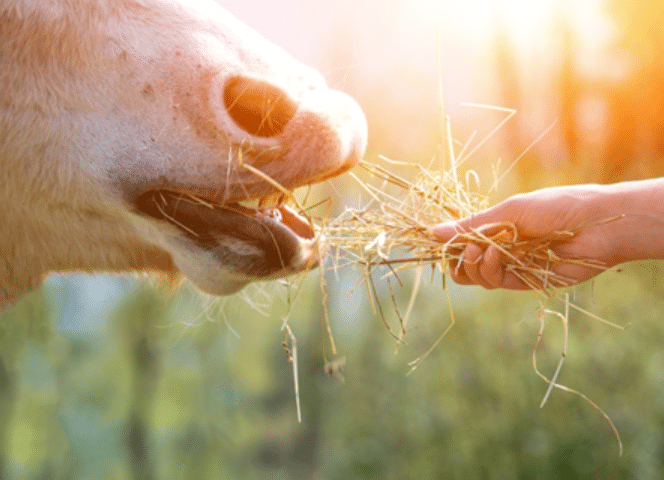Achieving a balanced diet is crucial for maintaining your horse’s overall health and optimising their performance. Properly balancing proteins, carbohydrates, and fats in your horse’s feed plays a significant role in meeting their nutritional needs. I’ll guide you through the importance of each nutrient and how to achieve a harmonious balance to support your horse’s well-being.
1. The Role of Proteins in Equine Nutrition: Proteins are essential for growth, muscle development, tissue repair, and various metabolic processes in horses. They provide the building blocks for enzymes, hormones, and antibodies. Ensuring a sufficient intake of high-quality protein sources is vital for meeting your horse’s protein requirements.
2. Understanding Carbohydrates in a Horse’s Diet: Carbohydrates are a primary source of energy for horses. They can be classified into structural (fibre) and non-structural (starches and sugars) carbohydrates. Fiber-rich forage is crucial for maintaining a healthy digestive system, while non-structural carbohydrates from grains or concentrates can provide readily available energy for horses in various activities.
3. The Importance of Fats for Equine Health: Fats play multiple roles in a horse’s diet, including providing concentrated energy, supporting nutrient absorption, and aiding in temperature regulation. Incorporating healthy fats, such as vegetable oils or stabilized rice bran, can be beneficial for horses with high energy requirements or those needing weight gain.
4. Achieving a Balanced Ratio: Maintaining a balanced ratio of proteins, carbohydrates, and fats is crucial for your horse’s overall health. The specific ratios will vary depending on factors such as your horse’s age, activity level, and individual needs. Consulting with an equine nutritionist or veterinarian can help determine the ideal balance for your horse’s specific requirements.
5. Assessing Feed Labels and Ingredient Lists: When selecting commercial feeds or concentrates, it is important to evaluate the protein, carbohydrate, and fat content. Pay attention to the ingredient list and opt for feeds with high-quality protein sources, appropriate carbohydrate levels, and beneficial fat sources. Understanding feed labels and ingredient lists empowers you to make informed decisions for your horse’s nutrition.
6. Monitoring and Adjusting the Diet: Regularly monitoring your horse’s body condition, performance, and overall health is essential for ensuring the diet remains balanced. Adjustments may be necessary based on changes in activity level, growth stages, or seasonal variations. Working with an equine nutritionist can help optimize your horse’s diet and make necessary adjustments for their well-being.
Balancing proteins, carbohydrates, and fats in your horse’s feed is crucial for maintaining their overall health and supporting optimal performance. Understanding the role of each nutrient, evaluating feed labels, and monitoring your horse’s individual needs are key steps in achieving a balanced diet. By working closely with an equine nutritionist and making informed decisions, you can provide your horse with the nutrients they need for a healthy, active, and thriving life.
This article was supplied to EquineShow247 by John Rymer Equine Sales, Marketing and Customer Support for Bluegrass Horse Feeds





